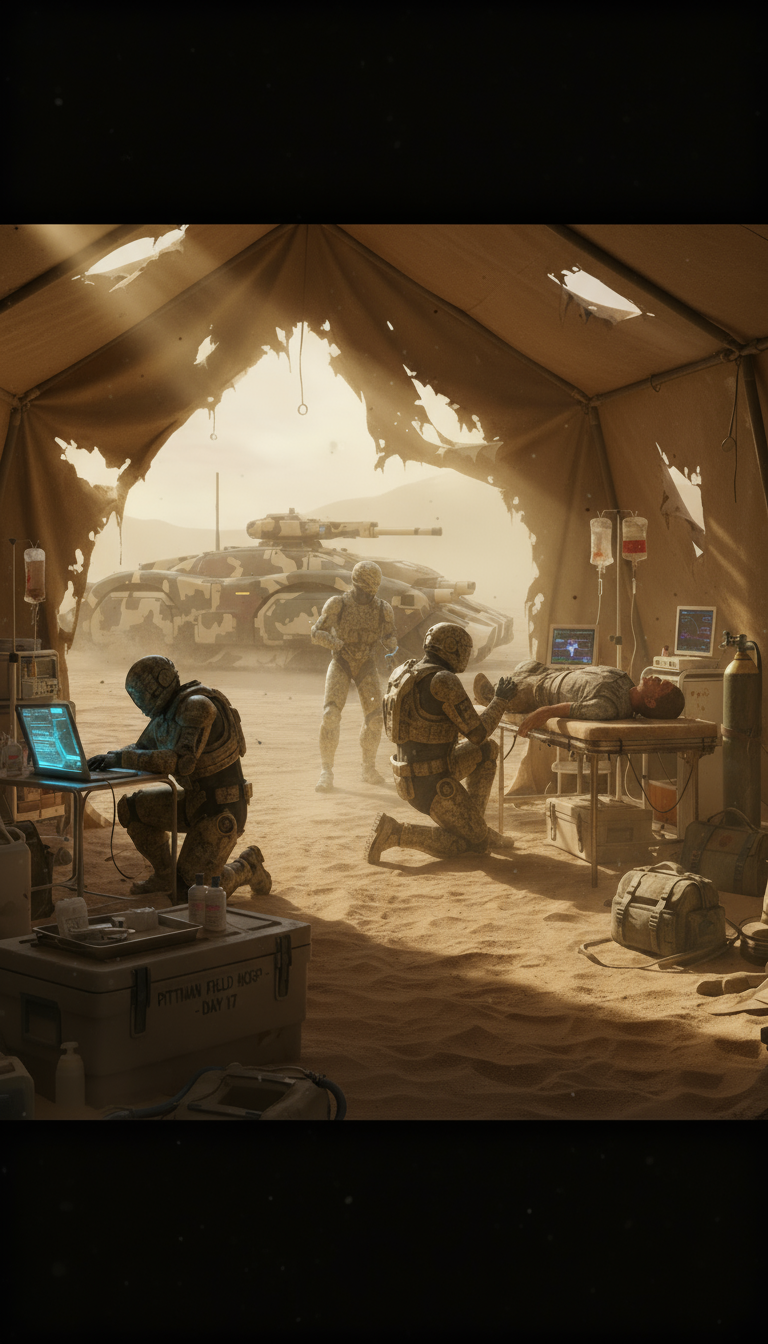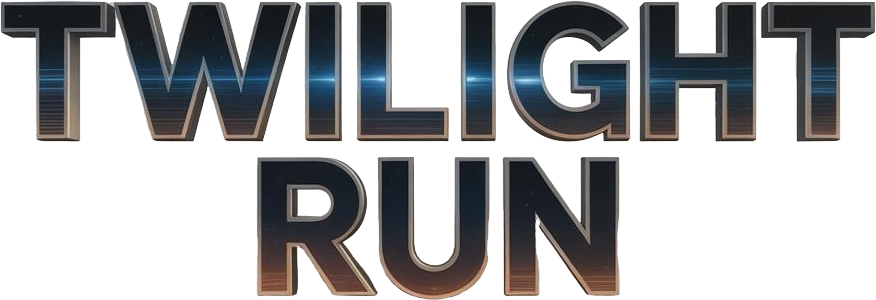Patch Up on Pittman

Day 17: Field Hospital Bravo
It has been two weeks and three days since my deployment to Pittman. The sand here is constant, clinging to everything, settling in every crease and fold of the medical tent where I spend most of my waking hours. No matter how often we wipe the tables or wash the instruments, the dust returns, a fine reminder of where we are and what this place has become.
The wounded arrive in waves, each more broken than the last. I have treated plasma burns that eat through flesh to the bone, limbs torn away by weapons we barely understand. We live on short bursts of rest and adrenaline. Each time I close my eyes, I see them again, the ones we could not save.
Day 18: The Toll
I have lost count of how many times I have had to tell soldiers that they will never walk again or that their arm is gone. Some just stare at me in silence, disbelief clouding their eyes. Others scream, curse, or break down completely. I move from one cot to the next, keeping my voice steady, hands working while my mind tries to stay detached. It is the only way to endure.
One of the younger Marines broke down today while I was stitching him up. He could not have been older than nineteen. His eyes were wide and wet as he gripped my sleeve, whispering, “Why, Doc? Why are they doing this to us?” I had no answer. I told him he would stand again someday, though we both knew that he never would.
Day 21: Breakthrough in Alien Physiology
Amid the chaos, there was a spark of progress. The science team finally made headway analyzing fragments of alien tissue recovered from the field. Their skin is unlike anything we have seen. It is incredibly dense, almost metallic, with a cellular pattern that conducts energy like a living circuit. That may explain how their weapons discharge bursts of plasma and why they can withstand their own attacks.
The team believes this discovery could lead to new treatments and countermeasures. They are working to design compounds that disrupt the energy pathways in the alien cells, turning their own biology into a weakness. It is still theoretical, but the thought that we might save lives with what we have learned gives us something to hold on to. Hope feels rare here, and tonight, it feels real again.
Day 23: Field Surgery at Point Delta
We were called out just after midnight. Alpha Squad had taken heavy fire near the cliffs at Point Delta. My team and I deployed immediately, setting up a triage station in the middle of the fight. The air was thick with smoke, and the ground trembled with the concussion of nearby explosions. It is a strange thing to operate while the world burns around you, yet somehow it becomes routine.
Corporal Jenkins was the worst case. His chest was torn open by a direct plasma hit. There was no time for evacuation. We worked on him in the dirt, our medpacks spread out around us. His eyes kept fluttering open, searching for mine, begging me not to stop. I worked until my arms were numb, praying the sedatives would hold long enough to spare him the pain. He did not make it. I closed his eyes myself and told his squad we did everything possible. That is the lie we tell them, and sometimes, it is the only mercy we can give.
Day 25: Psychological Fractures
Corporal Jackson broke today. He snapped during rounds, shouting that he could not take it anymore. He had gone three days without sleep, tending the wounded nonstop. When I tried to calm him, he wept like a child. I had no choice but to send him back to base for evaluation. Losing him means more strain on the rest of us, but we cannot afford to lose another medic to exhaustion.
It is not just Jackson. We are all unraveling, piece by piece. The constant noise, the smell of blood and antiseptic, the screams that never stop. There is no space for grief here, no time to process any of it. I can feel myself hardening inside, growing distant, and that frightens me more than the fighting. I do not want to become numb, yet detachment is the only armor we have left.
Day 30: A Glimmer of Progress
For the first time in weeks, I saw something close to a miracle. We treated Private Lee, whose arm had been almost destroyed by plasma fire. Using the new serum developed from alien cell samples, we tried to accelerate the regeneration process. To our astonishment, it worked. His tissue began to rebuild itself within hours, stronger than we expected. It is too soon to call it a cure, but it is the first real step toward healing rather than merely surviving.
For a brief moment, there were smiles in the tent. Even laughter. That small success breathed life back into all of us. If we can adapt their biology to our advantage, we might finally have the means to fight back—and save more of our own before this world consumes them all.
Day 34: The Price We Pay
Another long day. Another loss. I worked on a soldier who whispered his mother’s name until his voice faded. I held his hand until the end, because no one should die alone out here. His pulse slipped away beneath my fingers, and I told myself to move to the next patient. There is no time to mourn.
I look at my hands and barely recognize them. The skin is scarred, stained, and rough from the constant work. I wonder how much longer I can keep doing this. Yet tomorrow, when the wounded arrive, I will be ready. Because if I can save one more life, even one, it will be enough to keep going.
Captain Marcus Hale, Forward Medical Unit, Pittman War Zone
